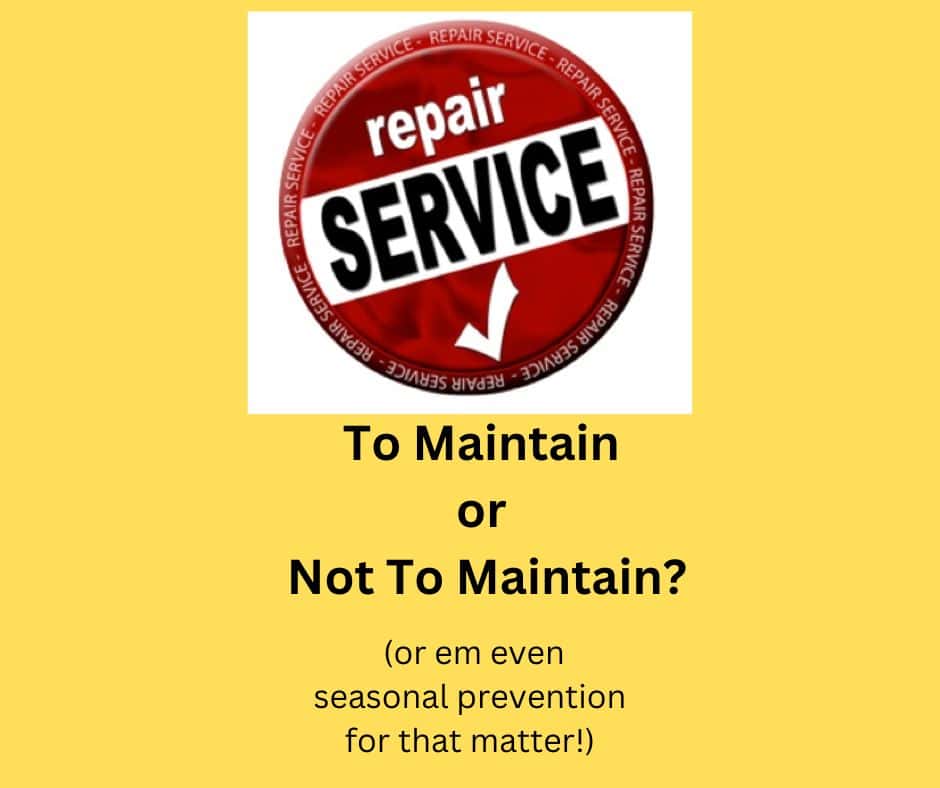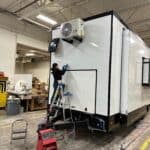 April 30, 2024
April 30, 2024
Maintaining your recreational or commercial trailer might not be the most glamorous aspect of ownership, but it’s undeniably crucial. Just like any other vehicle or equipment, trailers require regular upkeep to ensure they remain safe, reliable, and efficient. Neglecting maintenance can lead to costly repairs, safety hazards, and even legal issues. In this blog, we’ll explore the significance of scheduling regular maintenance for your trailer and the types of maintenance tasks you should prioritize.
Why Regular Maintenance Matters
- Safety First: Whether you’re hauling precious cargo, enjoying a family vacation, or trekking to a commercial event, safety should always be paramount. Regular maintenance helps identify and address potential safety hazards such as worn-out tires, faulty brakes, leaking roofs or slide outs, or damaged suspension components.
- Extended Lifespan: Investing time and effort in maintenance pays off in the long run. By addressing issues early on, you can prevent minor problems from escalating into major ones, ultimately prolonging the lifespan
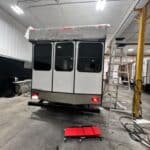 of your trailer.
of your trailer. - Optimal Performance: A well-maintained trailer operates more efficiently, providing smoother rides and better fuel economy. Regular checks and tune-ups ensure that all components are functioning at their best, optimizing performance on the road.
- Legal Compliance: Depending on your location and the type of trailer you own, there may be legal requirements regarding maintenance and inspections. Adhering to these regulations not only keeps you on the right side of the law but also ensures the safety of everyone on the road.
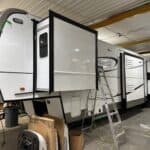
Types of Maintenance
- Inspecting Tires: Your trailer’s tires are its main point of contact with the road, so keeping them in good condition is essential. Regularly check tire pressure, tread depth, and overall conditions. Replace any worn-out or damaged tires promptly to avoid blowouts or accidents.
- Brake System Check: Properly functioning brakes are crucial for safe towing. Inspect brake pads, rotors, and brake fluid levels regularly. If you notice any signs of wear or deterioration, have the brake system inspected and serviced by a qualified technician.
- Greasing Bearings: Wheel bearings allow your trailer’s wheels to spin smoothly. Over time, they can become dry or contaminated with dirt and debris, leading to premature wear and potential failure. Grease the wheel bearings according to the manufacturer’s recommendations to ensure they remain properly lubricated.
- Checking Lights and Electrical Systems: Functional lights are essential for safe towing, especially when driving at night or in adverse weather conditions. Regularly inspect all exterior lights, including
- Brake lights, turn signals, and taillights. Test the trailer’s electrical connections and wiring to ensure proper functionality.
- Inspecting Suspension Components: The suspension system plays a vital role in providing stability and a smooth ride for your trailer. Inspect components such as leaf springs, shock absorbers, and suspension mounts for signs of wear or damage. Replace any worn-out or damaged parts to maintain optimal suspension performance.
- Inspecting Coupler and Hitch: The coupling mechanism and hitch are what connect your trailer to your vehicle, so it’s crucial to ensure they’re in good condition. Regularly inspect the coupler, hitch ball, and safety chains for any signs of wear, rust, or damage. Lubricate moving parts as needed to prevent corrosion and ensure smooth operation.
- Checking Trailer Flooring and Structure: The trailer’s flooring and structural integrity are essential for safely transporting cargo or equipment. Inspect the flooring for signs of rot, cracks, or damage. Check the trailer’s frame and welds for any signs of corrosion or structural weakness. Address any issues promptly to prevent further damage and ensure safety.
- Holding Tanks: Cleaning and maintaining your holding tanks is essential to an enjoyable and pleasurable experience. Before winter sets in, you should winterize all water sources and lines. T
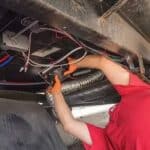 his is a fairly simple task, and we recommend having a professional service tech conduct this task.
his is a fairly simple task, and we recommend having a professional service tech conduct this task. - Slide Outs and Roofs: Getting in to the habit of sealing your roof at least once a year, while also checking on the rubber sealant on your slide outs can be a simple task and save you money and time of repairing or replacing them prematurely.
So, to maintain or Not to maintain?
Regular maintenance is key to keeping your recreational or commercial trailer safe, reliable, and efficient. By scheduling routine checks and addressing any issues promptly, you can extend the lifespan of your trailer, optimize its performance, and ensure the safety of yourself and others on the road. Remember, a well-maintained trailer is not just a convenience—it’s a necessity. So, don’t wait until something goes wrong; prioritize maintenance and enjoy worry-free travels with your trailer. For more information about the importance of preventative maintenance, or seasonal prepping of your trailer, email our warranty team at Warranty@rbdrv.com

….from your friends at Workforce by RBD


